Abstract
Objective:
A growing body of knowledge indicates that too much stress can negatively influence psychological and physical health. A model proposed by Smith to explore personal and situational variables, stress appraisal, and burnout has led to significant understanding of burnout of individuals working in service professions. We examined the relationship of hardiness, social support, and work-related issues relevant to athletic trainers to perceived stress and the relationship of perceived stress to burnout.
Design and Setting:
Correlational analyses were performed to examine the relationships predicted by Smith's model. In addition, we conducted stepwise multiple regression analyses to assess the relative contributions of the personal and situational variables to perceived stress and to examine the relative impact of perceived stress on 3 burnout factors (emotional exhaustion, personal accomplishment, and depersonalization).
Subjects:
One hundred eighteen certified athletic trainers working in National Collegiate Athletic Association Division I-A intercollegiate settings that maintain a football program.
Measurements:
We assessed personal and situational variables using the Hardiness Test, the Social Support Questionnaire, and the Athletic Training Issues Survey, adapted for this study. The Perceived Stress Scale was used to assess stress appraisal, and the Maslach Burnout Inventory was used to assess 3 dimensions of burnout.
Results:
Our results were in support of Smith's theoretical model of stress and burnout. Athletic trainers who scored lower on hardiness and social support and higher on athletic training issues tended to have higher levels of perceived stress. Furthermore, higher perceived stress scores were related to higher emotional exhaustion and depersonalization and lower levels of personal accomplishment.
Conclusions:
Our findings examining burnout in Division I athletic trainers were similar to those of other studies investigating coaches and coach-teachers and in support of Smith's theoretical model of stress and burnout.
Keywords: hardiness, social support, athletic training issues, sport psychology
Full text
PDF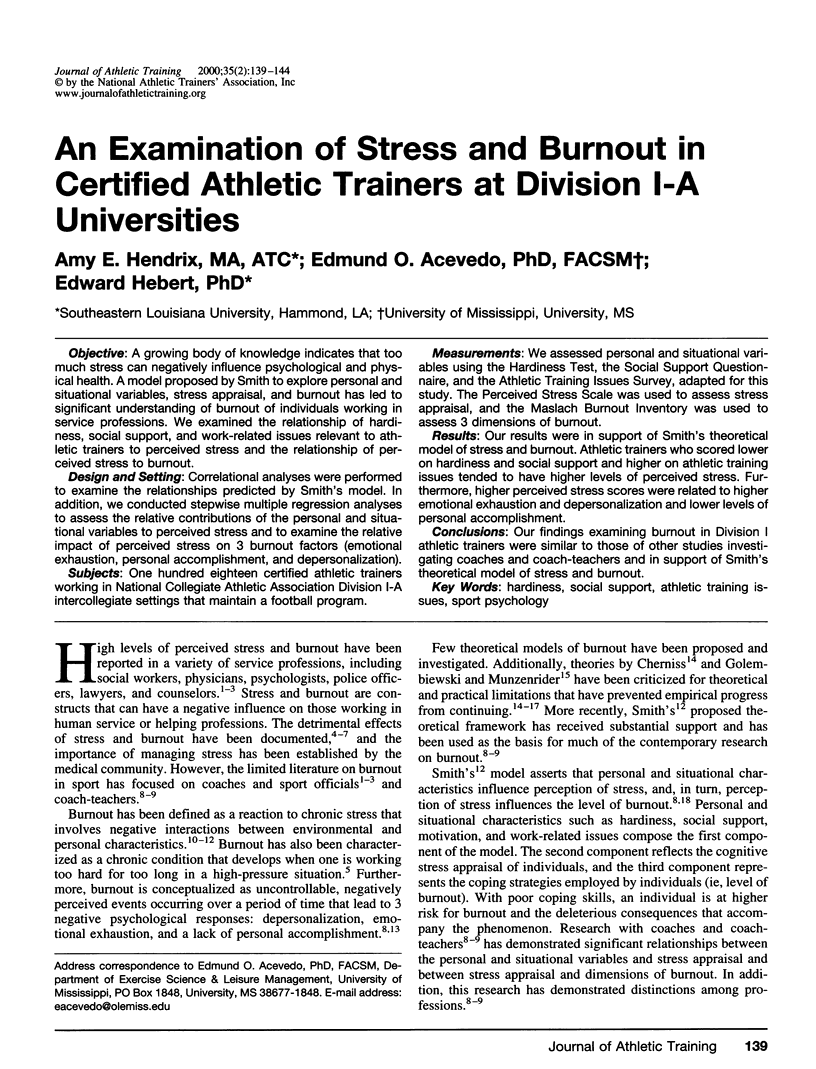
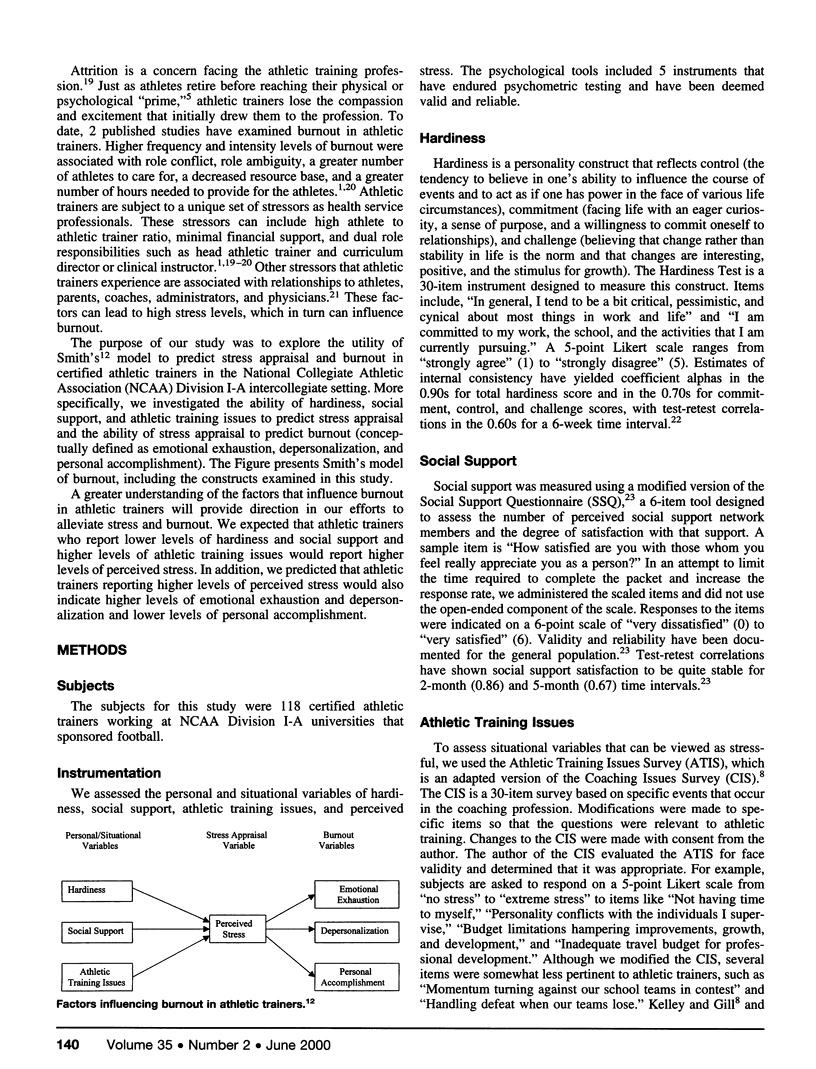
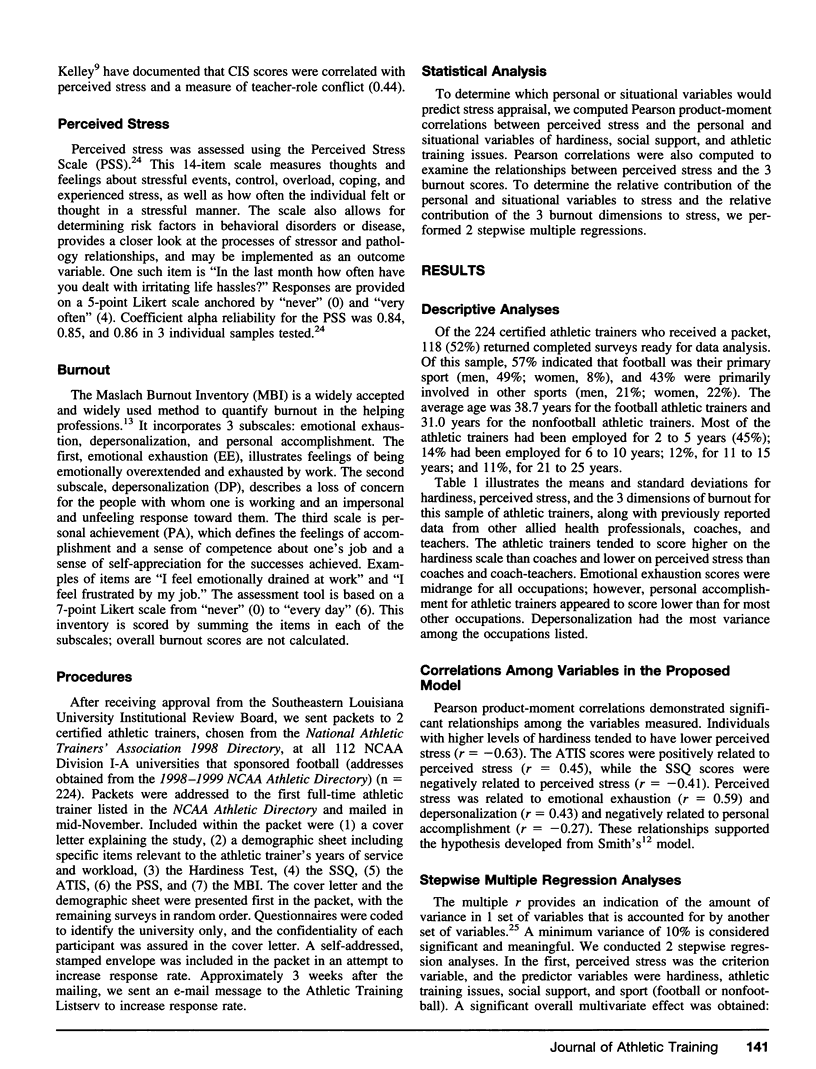
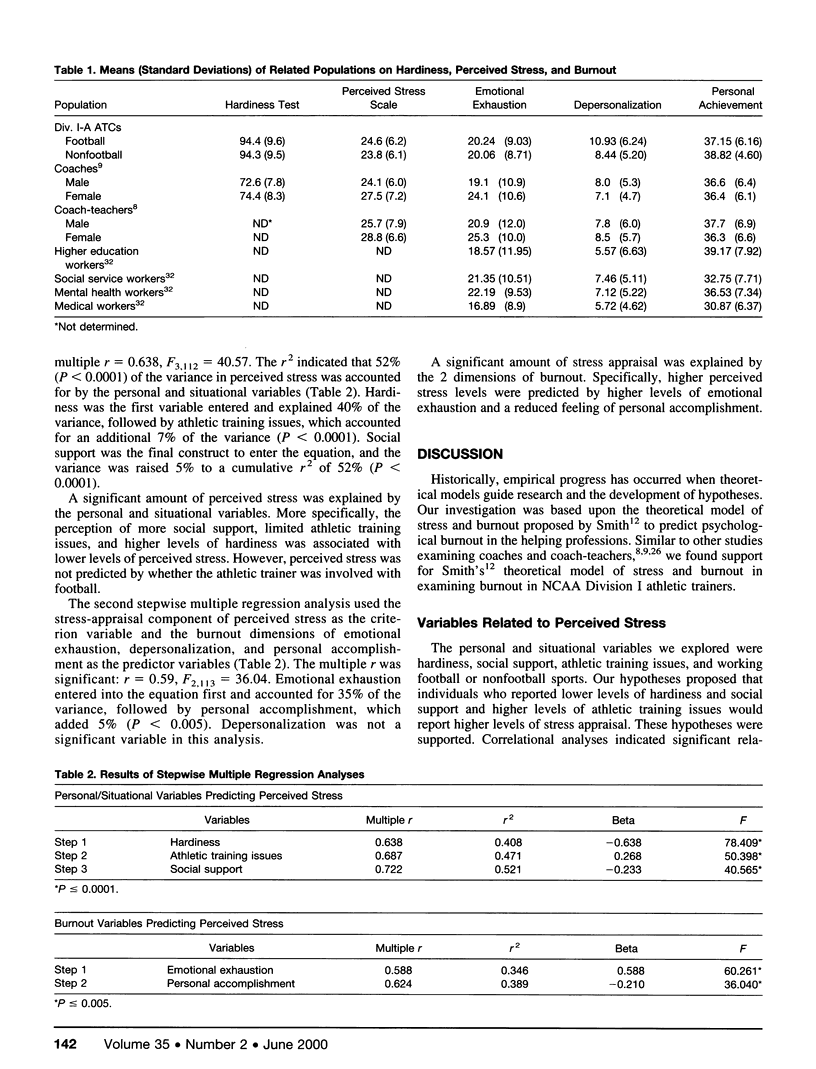
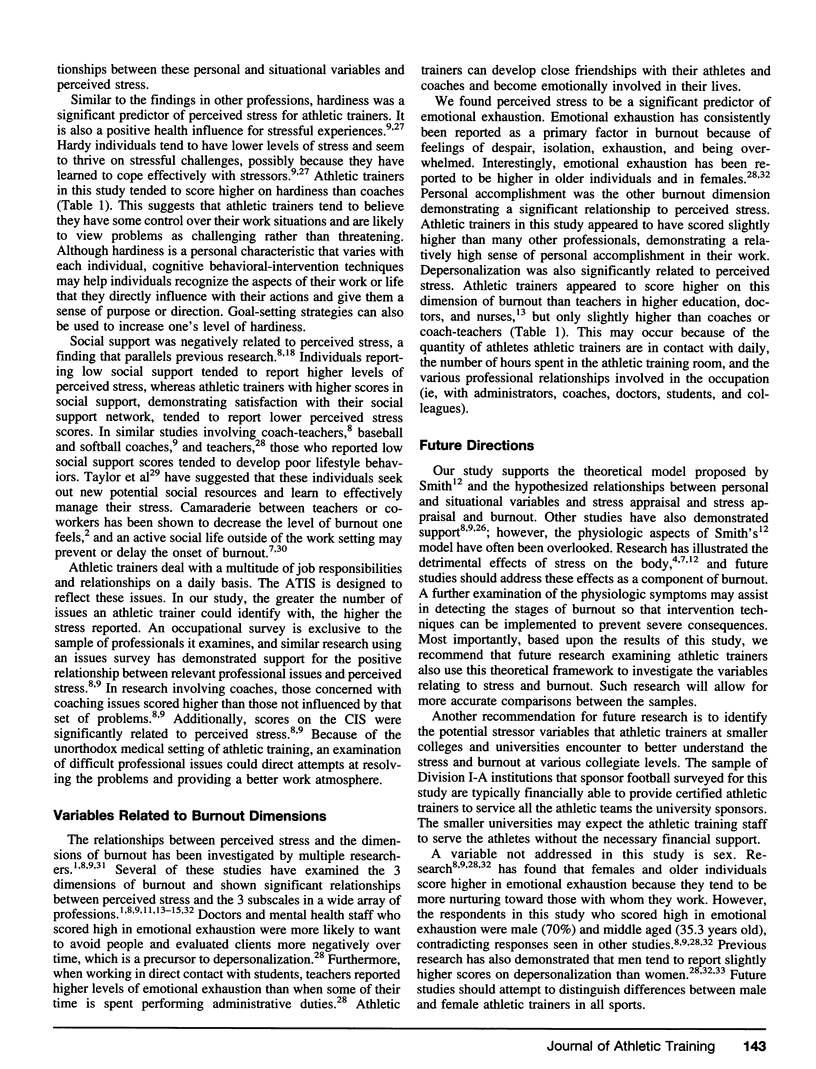
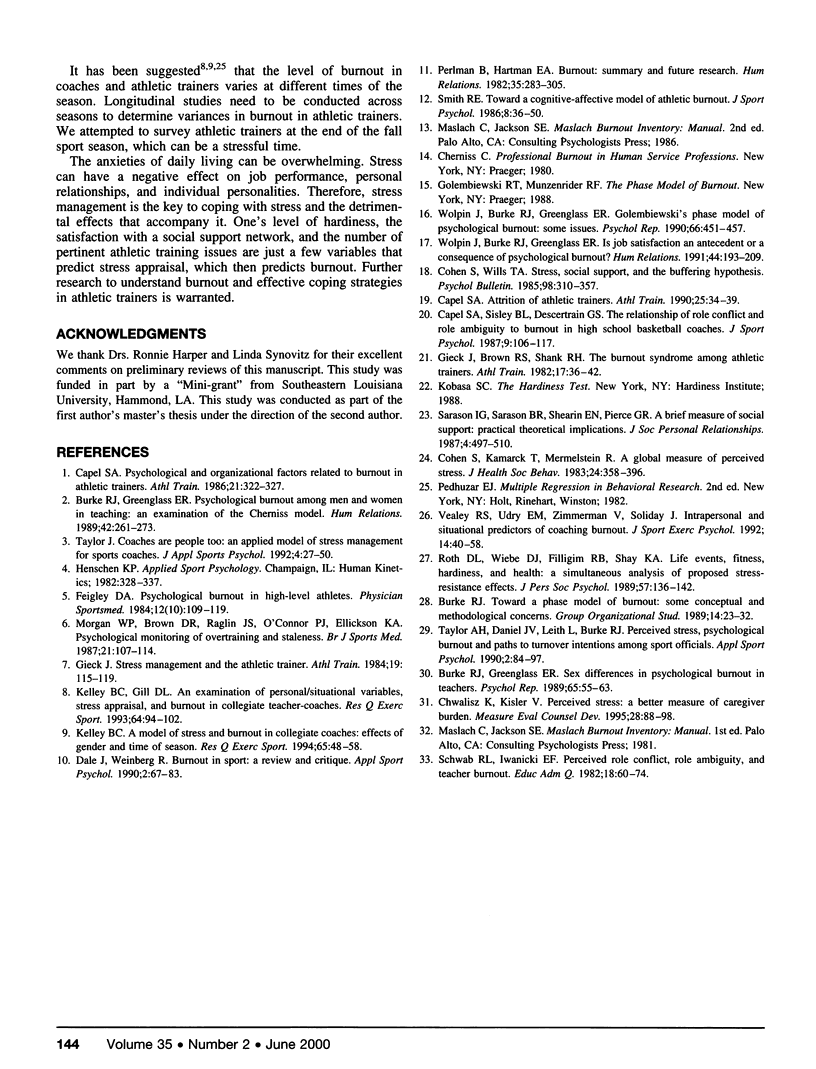
Selected References
These references are in PubMed. This may not be the complete list of references from this article.
- Burke R. J., Greenglass E. R. Sex differences in psychological burnout in teachers. Psychol Rep. 1989 Aug;65(1):55–63. doi: 10.2466/pr0.1989.65.1.55. [DOI] [PubMed] [Google Scholar]
- Cohen S., Kamarck T., Mermelstein R. A global measure of perceived stress. J Health Soc Behav. 1983 Dec;24(4):385–396. [PubMed] [Google Scholar]
- Cohen S., Wills T. A. Stress, social support, and the buffering hypothesis. Psychol Bull. 1985 Sep;98(2):310–357. [PubMed] [Google Scholar]
- Kelley B. C. A model of stress and burnout in collegiate coaches: effects of gender and time of season. Res Q Exerc Sport. 1994 Mar;65(1):48–58. doi: 10.1080/02701367.1994.10762207. [DOI] [PubMed] [Google Scholar]
- Kelley B. C., Gill D. L. An examination of personal/situational variables, stress appraisal, and burnout in collegiate teacher-coaches. Res Q Exerc Sport. 1993 Mar;64(1):94–102. doi: 10.1080/02701367.1993.10608783. [DOI] [PubMed] [Google Scholar]
- Morgan W. P., Brown D. R., Raglin J. S., O'Connor P. J., Ellickson K. A. Psychological monitoring of overtraining and staleness. Br J Sports Med. 1987 Sep;21(3):107–114. doi: 10.1136/bjsm.21.3.107. [DOI] [PMC free article] [PubMed] [Google Scholar]
- Roth D. L., Wiebe D. J., Fillingim R. B., Shay K. A. Life events, fitness, hardiness, and health: a simultaneous analysis of proposed stress-resistance effects. J Pers Soc Psychol. 1989 Jul;57(1):136–142. doi: 10.1037//0022-3514.57.1.136. [DOI] [PubMed] [Google Scholar]
- Wolpin J., Burke R. J., Greenglass E. R. Golembiewski's phase model of psychological burnout: some issues. Psychol Rep. 1990 Apr;66(2):451–457. doi: 10.2466/pr0.1990.66.2.451. [DOI] [PubMed] [Google Scholar]



